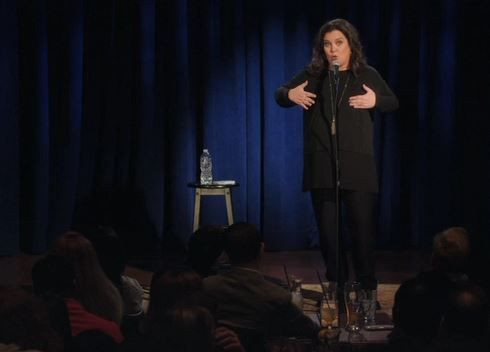Rosie O’Donnell Discusses Heart Attack In Valentine's Day HBO Comedy Special 'A Heartfelt Special'

Heart attacks steal the lives of thousands of women every year in America, and most don’t even realize it’s the number one killer in women. When actress, comedian, and television host Rosie O’Donnell had a major heart attack at the age of 50, she nearly lost her life. In a hybrid mix of humor and women’s health information, O’Donnell shares her story through an hour-long standup routine, which is set to premiere on HBO this Saturday night on Valentine’s Day for February’s American National Heart Month.
She weaves in and out of narrative for the first 40 minutes, discussing her child’s circumcision with Steven Spielberg, her love for Barbara Streisand, being a mother to teenagers and a newborn, and life with her now ex-wife Michelle Rounds, who was just recovering from a rare cancer before O’Donnell’s heart attack. More than two years after her heart attack in 2012, she announced earlier this month she will be leaving ABC’s morning show The View because of concerns over the stressful toll it’s taking on her heart health.
One day while leaving from her wife’s routine checkup at the hospital, a heavyset woman was stuck getting out of the car. “I estimated she was over 400 pounds, and I know this because I understand the shame of being overweight in America,” O’Donnell said, adding it took them 20 minutes to help the woman up and bring her into the hospital.
“Two hours later, my biceps were killing me, not a little bit and it wasn’t radiating pain,” she said. “It was as though a bear had grabbed both of my arms and ripped out the muscle. I thought this must have been from lifting her up, and then my son Blake, who was 12 at the time, said, ‘Mommy, you look like a ghost.’”
Instead of checking into a hospital herself, she went to her therapist for help. O’Donnell jokingly recalled her advice, and said she told her she wasn’t having a heart attack but was instead transforming her emotions into physical pain after seeing the heavyset woman. O’Donnell has dealt with weight issues throughout her life, and at her heaviest weighed 230 pounds. She said the emotional turmoil of seeing a woman handicapped from her weight left her in physical pain.
So, she went home. She was hotter than she had ever been in her life, even more than when she went through menopause in her 40s. After experiencing a depleting exhaustion, she threw up and said, when you’re having a heart attack, it’s your body’s last defense, so call for help. A quick Google search showed her she had five out of the five signs for a woman having a heart attack, and she became a statistic. When women have a heart attack, 75 to 80 percent don’t seek medical attention. Meanwhile, 90 percent of men call 911 at the first signs of chest pain. More women die of heart disease than men.
“[Heart Disease] is the No.1 killer in women because they don’t recognize the symptoms,” Medical Correspondent Dr. Sanjay Gupta said in a CNN interview about O’Donnell’s condition. “The symptoms then progress more, and they’re less likely to survive.”
The Widow Maker
When she finally went to a cardiologist it was Wednesday evening. The doctor told her she had had a heart attack Monday morning, and there was an ambulance waiting for her outside. When she arrived, they discovered there was a blockage in her left descending artery (LAD), which supplies most of the blood to the rest of the body. The artery’s nickname is “the widow maker” of coronary disease, according to the Cleveland Clinic.
She survived the surgery and was able to tell her story. She was the only patient the hospital had seen survive having 100 percent LAD blockage for more than 10 hours, and she was blocked more than 50 hours. Her survival was a medical mystery and O’Donnell decided to share her story on a platform with a comedic twist of confession and critical information, in order to deliver this widely overlooked medical advice. Women often don’t know their own gender-specific symptoms of a heart attack enough to seek help.
“When the doctor said I was having a heart attack I’m like, ‘Shouldn’t that feel like Mike Tyson punched me in the tit? Isn’t that what a heart attack is supposed to feel like?’” O’Donnell said. “I didn’t know I had a heart attack, and I thought maybe the reason I didn’t die was because I have a public voice and I can share the facts with everybody. Maybe that’s the reason.”
Every year, more women die of heart disease than from all forms of cancer combined. That’s 300,000 American women, making it the leading cause of death among women, according to The Heart Foundation. To help understand the symptoms, which are unique to women, O’Donnell suggests memorizing an acronym she created, HEPPP: Hot, Exhausted, Pain, Pale, and Puke. Her close call led her to close the standup, but she cautions her audience, “Please call 911. Know the signs and save yourself.”



























